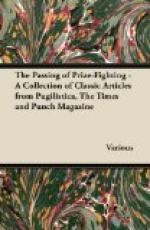“We are getting on,” as Sir HENRY CAMPBELL-BANNERMAN said on a famous occasion. Formerly it was considered the height of Parliamentary impropriety to say in so many words that an Hon. Member was not telling the truth; and all sorts of more or less transparent subterfuges, of which Mr. CHURCHILL’s “terminological inexactitude” is the best remembered, were employed to evade this breach of good manners. But the present House is thicker-skinned than its predecessors, and heard without a tremor the following conversation between the MINISTER OF PENSIONS and Mr. HOGGE:— Mr. Barnes: “I never said there was a scale.” Mr. Hogge: “Yes, you did.” Mr. Barnes: “No, I didn’t.”
A little later on, Mr. SWIFT MACNEILL always a stickler for constitutional precedent, attacked the Government for introducing important Bills—including one for extending once more the life of this immortal Parliament—without vouchsafing any explanation of them. He appealed to the SPEAKER to condemn this procedure as being contrary to the spirit of the standing order. Mr. LOWTHER explained that it was his business to carry out the rules of the House, not to express opinions about the use that was made of them. But he ventured to remind the Hon. Member that under this rule a Home Rule Bill, a Welsh Disestablishment Bill and a Plural Voting Bill had all been introduced on a single day. And it is not on record that on that occasion Mr. MACNEILL entered any protest.
Wednesday, March 28th—Rumours that Mr. ASQUITH was about to make a public recantation of his hostility to Women’s Suffrage caused a large attendance of Members, Peers and the general public. The interval of waiting was beguiled by, among others, Mr. PEMBERTON BILLING, who, having been told by Mr. MACPHERSON that the number of accidents during the training of pilots during the last half-year of 1916 was 1.53 per cent., proceeded to inquire, “What is the percentage based on? Is it percentage per hundred?” Mr. BILLING may be comforted by the recollection that a greater than he, Lord RANDOLPH CHURCHILL, confessed that he “never could understand what those d—d dots meant.”
The Editor of The Glasgow High School Magazine must be a proud man this day, for he has been mentioned in Parliament. It seems that he has been refused permission to post his periodical to subscribers in neutral countries, and Mr. MACPHERSON explained that this was in pursuance of a general rule, since “school magazines contain much information useful to the enemy.” It is pleasant to picture the German General Staff laboriously ploughing through reports of football-matches, juvenile poems and letters to the Editor complaining of the rise in prices at the tuck-shop, in order to discover that Second-Lieutenant Blank, of the Umptieth Battery, R.F.A., is stationed in Mesopotamia, and therefrom to deduce the present distribution of the British Army.
The SPEAKER occupied the Chair during the discussion of the recommendations of his Conference on Electoral Reform, and heard nothing but good of himself. It was, indeed, a notable achievement to have induced so heterogeneous a collection of Members to present a practically unanimous report on a bundle of problems acutely controversial.




